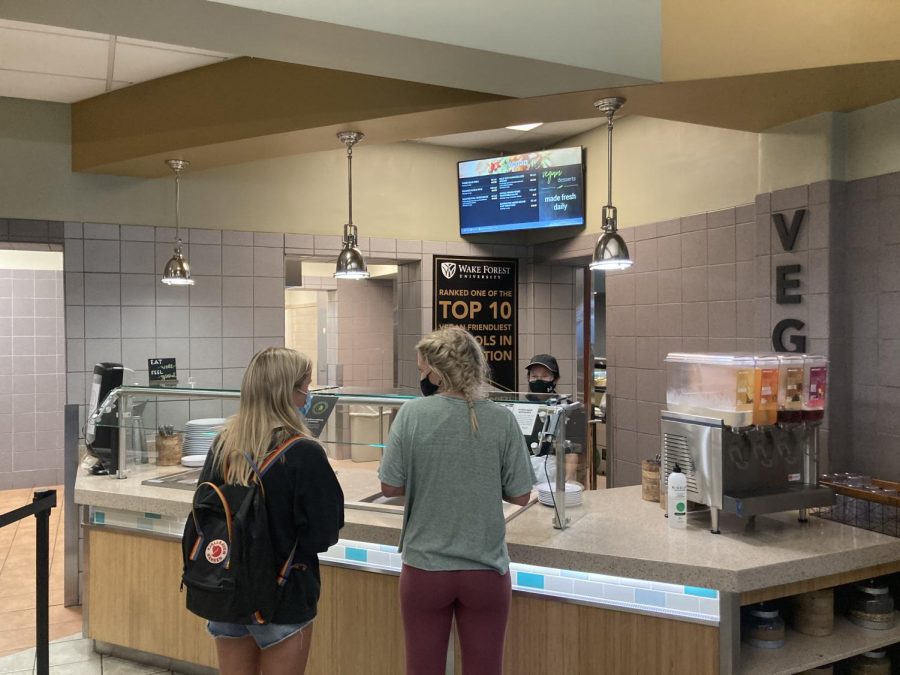Four years in, plant-forward dining is a success
The Pit’s introduction of the Vegan Station has minimized the university’s carbon footprint
Plant-based dining has increased in popularity at Wake Forest, especially after the introduction of the Vegan Station at the Pit four years ago.
April 29, 2021
Just over four years since the rollout of a new “plant-forward” eating initiative, Wake Forest has built a strong reputation as a national top-10 school for vegan friendliness.
When the university implemented the initiative in March 2017, it was primarily aimed toward the small number of vegans on campus, but Assistant Director of Sustainability Engagement Brian Cohen says that the initiative has fostered plant-forward dining on campus.
“It was created in response to a growing demand,” Cohen said. “And it has helped to further that demand.”
A vegan diet is regarded as the “single biggest way” to reduce one’s environmental impact. Researchers at the University of Oxford have found that cutting meat and dairy out of a diet can reduce someone’s carbon footprint by up to 73%.
Though switching to a vegan diet sounds intimidating, several chefs on Wake Forest’s campus have challenged themselves to come up with creative vegan recipes, which has resulted in non-vegan students coming back time and time again.
Wake Forest freshman Anna Barkley eats at the vegan station in the Pit for almost every meal and has seen the vegan options grow more popular over the past few months.
“There have been new wild and crazy concoctions that everyone wants to try,” Barkley said. “The lines are getting really long lately, and just the presence of the vegan station has added a lot more awareness.”
This popularity is a sign of the initiative’s success.
Cohen added that the goal is not to make anyone become vegan, but instead to prioritize eating plant-based foods.
“A lot of our communication and education efforts are based around this idea of plant-forward dining,” Cohen said. “It’s not an all-or-nothing proposition.”
Cohen also noted that the Vegan Station provides opportunities for Wake Forest’s chefs to engage in a culinary conversation with students.
“The vegan station (and other locations) allows our chefs to feature unique, innovative dishes that help expand the student’s understanding of what ‘plant-forward’ dining is really about,” Cohen said.
Plant-forward dining has resulted in an increase in student demand for plant-based food, along with decreased demand for animal-based food.
The main benefit of the initiative’s success is minimizing the school’s carbon footprint. Even on an individual basis, the numbers speak for themselves. If an individual student ate vegan one day a week for a whole semester, they would stop the creation of 315 pounds of CO2 and would save over 17,000 gallons of water otherwise used for the production of animal-based foods, according to world-renowned author and environmental activist Kathy Freston.
Deacon Dining Health and Wellness Manager Madison Fishler said that anywhere from 50-150 students eat at the Pit Vegan Station during lunch and dinner (the station is not open for breakfast), a figure which does not include the students eating vegan at other on-campus locations.
In fact, many students are seemingly attracted to Wake Forest for its array of vegan options.
Wake Forest sophomore Khushi Arya has been a lifelong vegetarian, and it never occurred to her that she should be worried about the lack of potential plant-based options until she toured colleges.
“We took a road trip to Wake Forest, and my grandmother told me the South has very few meatless options, so I thought I would be cooking in the kitchen every day,” Arya said. “I was so relieved to see how many options Wake Forest had, and I was drawn to it as a result”
Arya has valued how much Wake Forest values sustainable eating.
“The culture at Wake Forest really promotes ‘plant-forward’ dining, with different challenges each month, and the activities the sustainability office put on before COVID-19,” Arya said.
She and her friends have begun a new tradition of eating vegan every day for dinner, though her friends typically eat meat on a daily basis. Even small actions like this can increase awareness of the benefits of a vegan or “plant-forward” diet. It can also help to break the stereotypes associated with a plant-based diet, such as that vegan food does not contain enough protein or that it does not taste as good as animal-based foods.
Though Cohen acknowledges that there is still a lot of progress to be made, he gives the vegan chefs at Wake Forest plenty of credit for their creativity, which has introduced many students to the myriad of “plant-forward” options available, both at the Pit and at other campus dining establishments.





















